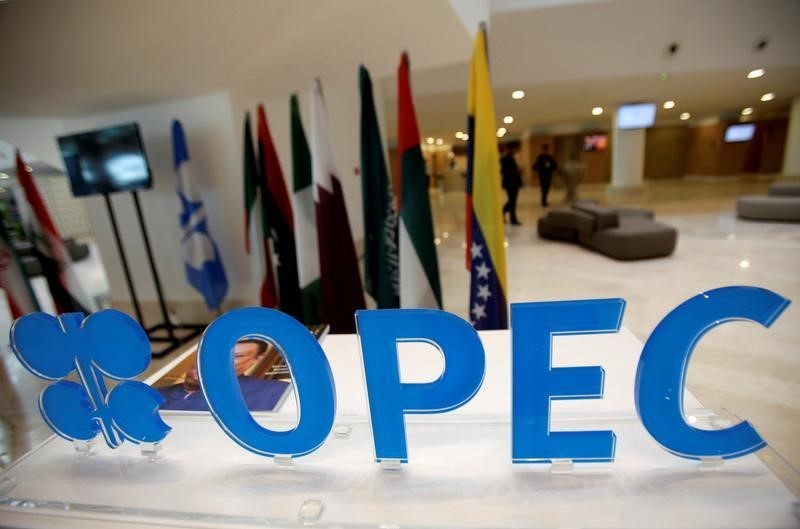(Bloomberg) -- OPEC warned of risks to the oil market from the resurgent pandemic, a day before the group and its allies meet to consider another increase in production.
“The outlook for the first half of 2021 is very mixed,” OPEC Secretary-General Mohammad Barkindo said at a preparatory meeting on Sunday. “There are still many downside risks to juggle.”
The alliance of producers led by Saudi Arabia and Russia will decide on Monday whether it can continue to restore crude supplies without capsizing the price recovery they spent most of 2020 working to achieve.
Moscow believes that the group -- which slashed output last year -- can revive another 500,000 barrels a day of idle capacity in February, on top of an increase scheduled for this month.
Riyadh, which has favored greater caution, is keeping its own views under wraps. But at the meeting on Sunday, a Saudi official noted the fragility of the recovery, according to delegates who declined to be named. Other countries also expressed caution about increasing output, delegates said after the meeting ran late into Sunday evening.
“We think the producer group will opt to forgo any further production increases for February with Covid-19 cases continuing to climb and the slower than expected vaccine rollout,” said Helima Croft, chief commodities strategist at RBC Capital Markets LLC.
Saudi Energy Minister Prince Abdulaziz bin Salman hasn’t publicly expressed a preference beyond his intention to keep speculators “on their toes.”
Whatever it ultimately decides, the Organization of Petroleum Exporting Countries and its partners are leaving nothing to chance. With the gathering on Monday, the coalition is switching to meeting every month -- rather than just a few times a year -- in order to fine-tune production levels more precisely.
Currently idling 7.2 million barrels a day, or about 7% of world supplies, the producers plan to return a further 1.5 million barrels a day in careful installments.
Click here to follow Monday’s OPEC+ TopLive blog
The case for another small increase in February is underpinned by a recovery in the oil price, and the emergence of Covid vaccines.
The vaccines have created a “healthier” outlook for oil consumption, which will soon “shift from reverse to forward gear,” Barkindo said at the Joint Technical Committee meeting on Sunday. The panel assesses implementation on behalf of the 23-nation alliance.
Russian Deputy Prime Minister Alexander Novak has signaled his readiness to proceed, saying last month that prices are in an optimal range of $45 to $55 a barrel. If OPEC+ refrains from bolstering exports, its competitors will simply fill the gap, he said.
Oil prices have stabilized above $50 barrel in London despite OPEC’s pledge of extra supply, bolstered by vaccine developments and robust fuel use in Asia. Supply and demand should remain broadly balanced in the first half of the year, according to the Paris-based International Energy Agency.
“The market has underlying support and as such should shrug off a modest increase in OPEC+ supply,” said Doug King, chief investment officer of the Merchant Commodity Fund, which manages $170 million.
It’s not just Russia that might favor opening the taps.
Last month, OPEC+ talks ran into a five-day stalemate as Saudi Arabia and the United Arab Emirates -- for years stalwart allies in both political and energy spheres -- disagreed over how quickly to revive the idled barrels.
While the kingdom wanted to delay any increases for three months, its neighbor -- eager to monetize investments in capacity and promote a new regional oil benchmark -- pushed for a speedier timetable.
That might also come as a relief to OPEC+ members like Iraq. Baghdad is engulfed in a mounting economic crisis that is only exacerbated by limits on oil sales, and is struggling to get through a backlog of overdue output cuts from 2020.
Yet Barkindo also outlined the need for caution.
Restrictions on movement remain in place in a number of countries amid a new strain of the virus, he said. It’s too soon to know how key sectors of the economy will be affected, and for the tourism and leisure industries the return to pre-crisis levels could take a couple of years.
Oil inventories in developed nations remain 163 million barrels above their five-year average level, Barkindo added. Despite the market’s rebound, crude prices remain far below the levels most OPEC members need to cover government spending.
While the IEA anticipates no fresh surplus, it warned that the existing inventory overhang will linger to the end of the year if OPEC+ opens the taps.
(adds detail in fifth)
©2021 Bloomberg L.P.
